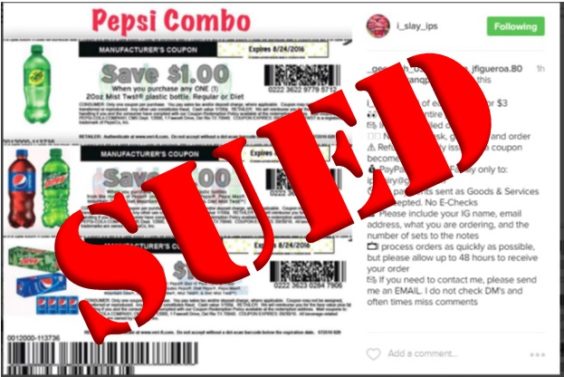
Could this be the beginning of the end for “coupon fairies” who’ve made a mockery of print limits, by offering unlimited printable coupons for sale online? The owner of Coupons.com has filed a federal lawsuit against one particularly prolific coupon seller, in an attempt to shut her down – and to issue a stark warning to others who are doing the same.
Quotient Technology filed the lawsuit in its home state of California on Wednesday. The defendant is an Instagram seller known variously as “i_slay_ips”, “i_slay_ip”, and “ip_queen_”, and now appears to go by the name “pdf_queen” (many printable coupon sellers, dubbed “coupon fairies”, have been known to frequently switch user names, in order to evade detection).
Quotient doesn’t know the actual identity of the seller. So the company has sued in order to find out. Once it determines who “pdf_queen” is, it plans to demand that she stop printing and selling coupons, hand over the profits from her illicit operation, and pay damages.
Coupons.com and most other printable coupon providers generally limit users to two prints per device. But some users have come up with ways to utilize separate user accounts, incognito browsers, virtual machines, dynamic IP addresses, PDF printers and other methods to get around those print limits. By using those methods, then automating the process of printing coupons, they are able to rapidly generate an unlimited number of coupons with unique ID’s, depleting supplies and denying others the ability to access coupons before particularly popular ones hit their print limits.
In its lawsuit, Quotient says the defendant has been “circumventing Quotient’s device-based print limits by deceiving Quotient’s servers into perceiving that Defendant had thousands of different devices… As a result, Defendant has been able to make thousands of additional successful calls to Quotient’s servers and obtain thousands of additional digital printable coupons that Defendant would not have been able to obtain had Defendant not circumvented Quotient’s technical barriers.”
By circumventing the print limits, and selling coupons for personal gain, Quotient contends that the defendant is violating Coupons.com’s terms of use and license agreement, to which the defendant agreed. And that, Quotient argues, makes it a violation of state and federal law.
Quotient cites the federal Computer Fraud and Abuse Act, and the California Comprehensive Computer Access and Fraud Act. The federal law is essentially an anti-hacking measure that prohibits unauthorized access to computers and networks. It’s been amended several times to incorporate a range of other activities, but legal experts and courts have differed about whether merely violating a company’s terms of use constitutes a crime under the law. Plaintiffs have had slightly better luck arguing that users who willfully circumvent barriers put in place to enforce those terms, does constitute “unauthorized access” under the law. The California law is much broader, so both arguments may prevail there.
Quotient also accuses the defendant of breach of contract and misappropriation, for “appropriating for himself or herself the substantial investment of time, effort, and expense that Quotient has expended.”
But “pdf_queen” is defending her actions. “I do not believe any wrong is being done by selling legitimate coupons that have unique PIN numbers,” she told Coupons in the News via email, in response to a request for comment. Most sellers, she said, “are only using our computers and not altering their software or hacking into their systems.” She did not reveal her identity in the email (sorry, Quotient).
Quotient declined to comment on the case. But in its lawsuit, it says the seller is causing irreparable harm to its business, its brand and retail partners, and consumers. The seller’s activity “has caused tension with Quotient’s partners,” who “trust Quotient to make their digital printable coupons available according to the print attempt limits they set. Without adequate technical measures to enforce these print attempt limits, Quotient’s partners may not make their digital printable coupons available through Quotient (or would otherwise limit the volume offered).”
Some of Quotient’s brand partners are already upset with the company, and its handling of the issue thus far. They’re reporting that many of their coupons are being printed, and redeemed, far in excess of what they had budgeted for.
“Quotient takes any violation of our terms of service seriously and continues to use all available legal recourses against any violators,” CEO Steven Boal told Coupons in the News last month. But he also argued that the large-scale selling of printable coupons online was not as big a problem as some made it out to be. “We believe that the security around our platform provides lower risk of fraud than offline promotions,” he said. “And for the industry overall, this is an infinitesimally small problem.”
The lawsuit could be seen as an acknowledgement that the problem is a little bigger than Quotient first thought.
As it turns out, Coupons.com’s new PDF-based printing system may have helped to enable the very problem that Quotient is now trying to fight. The PDF system allows sellers to generate printable coupons, without having to print them at all. Quotient’s software sends coupons “directly from Quotient’s servers to the consumer’s printer,” the company claims in its lawsuit. “The software prevents consumers from downloading coupons onto their devices in an effort to prevent consumers from using third party software to manipulate these coupons.”
But that’s actually not the case. The PDF-based system displays an image of your selected coupon on your computer screen – a violation of long-standing industry best practices. Then, a print window asks how many copies you’d like to print, or whether you’d like to save a copy to your computer. Printing multiple copies is inadvisable, since they’d all have the same unique ID’s. But inexperienced coupon users may not know that, and could perceive the prompt as an invitation to print and use as many copies as they’d like. Meanwhile, nefarious coupon users can save a high-resolution PDF of the coupon, and use photo-editing software to create high-quality counterfeits.
And coupon fairies can save their thousands of coupons as PDF files, without ever having to print them on paper. That allows them to transfer the PDF files to buyers via email, instead of sending paper coupons through the mail. And that makes it all the more difficult to identify the sellers and track them down.
In the case of “pdf_queen”, however, Quotient is determined to find and stop her. Quotient didn’t say why she was singled out, out of all the printable coupon sellers currently operating. It may be because Quotient was able to identify at least one real IP address it believes the defendant used. In filing the lawsuit, Quotient plans to ask the court’s permission to compel the internet service provider, Instagram and, if necessary, “other third parties identified in Defendant’s Instagram posts” to give up her identity.
The lawsuit represents a different legal strategy than the one that Quotient – then known simply as Coupons.com – used nearly a decade ago, in another high-profile lawsuit against a user who was circumventing print limits. In that case, California resident John Stottlemire was modifying Coupons.com’s printing software after downloading it to his computer – and sharing his discovery with others online.
Coupons.com contended that modifying its software to remove print limits was a violation of the Digital Millennium Copyright Act. Stottlemire disagreed, arguing that it could not be a crime to change or delete files from his own computer. A year later, Coupons.com modified its software to thwart Stottlemire’s workaround, dropped the lawsuit, and Stottlemire claimed victory. “Without being represented by an attorney,” he told Wired magazine, “by refusing to succumb to their bullying tactics, I continued to assert my innocence and fought the claims Coupons Inc. filed against me.”
Quotient hopes to have greater success this time. But the big question is – what if its latest legal gambit fails? What if Quotient can’t identify “pdf_queen”, can’t prove she violated federal or state laws, and ends up dropping its case just as it did a decade ago? Will that give coupon fairies the go-ahead to run rampant, continuing to print and sell thousands of printable coupons at a time without fear of any consequences? Or will Quotient be forced to come up with its own solution to a problem that it has publicly branded as “infinitesimally small”?
Perhaps. Or, if “pdf_queen” caves under pressure and stops voluntarily – or fights the lawsuit and loses – other coupon fairies will be put on notice that they could be next. And then, if you’ve ever bought or sold printable coupons online, you’ll have to go back to obtaining your printable coupons the old-fashioned way – by printing them. Two coupons at a time.











Cupons
IMHO, once again, Coupons.com (what ever name they are going by today) doesn’t have a leg to stand on. (yes, the real John Stottlemire).
I would like to add, coupons.com did not “drop the lawsuit” against me. I offered them a settlement agreement and they accepted.
Thanks for weighing in, and for the clarification, John.
I think Coupons In The News should conduct a poll of its subscribers: Which group of slimy coupon fraudsters do you find most offensive: a) Counterfeiters; b) Glitchers; c) Sunday paper insert thieves/diverters/sellers; d) IP Fairies; e) people who steal blinkies and peelies from inside retail stores and sell them on the Internet; or f) people who e-mail or call Company’s consumer relations departments with bogus complaints in an attempt to have them mail you free product coupons.
The mass insert sellers are not buying inserts, they are buying the left over, unsold Sunday papers. It’s legal.
Brittany — I am not talking about the people who pull a few dozen inserts out of the unsold Sunday papers and sell them. I’m talking about the people who get THOUSANDS of inserts AND get them 1-2 weeks before they are scheduled to appear in the Sunday papers. The primary way they get thousands of these this early is via diversion from the Newspaper Companies. It is RECEIVING STOLEN PROPERTY and the ultimate sale of these inserts constitutes a crime. Many folks have been arrested for this kind of activity, as documented right here in previous Coupons In The News articles!
You might want to get the facts on this. There are two primary Sunday paper coupon insert providers. They are News America Marketing and Valassis. Check with either or both of them. They will tell you the exact same thing: COUPON INSERTS ARE NOT FOR SALE BY THEM NOR OR THEY AUTHORIZED FOR SALE BY THE COMPANIES WHOSE COUPONS APPEAR IN THEM! Let me know if you get a different answer from either of them. Thanks!
They should lift the ridiculous 2 prints per device. It’s called supply and demand and they obviously aren’t supplying enough to consumers creating a need to get them elsewhere to fulfill our needs.
This debate could go on forever about who’s right and wrong but my point of view is from the consumer not the business that IMO is hoarding the goods creating it’s own issue’s.
I completely agree here. To take full advantage of a deal or even most deals, it require you to buy in quantities of 3 or 4 minimum. 2 really? What’s the point.
Glad to see Quotient taking action against at least one of these fraudsters, albeit it a bit late. Another classic example of the greed that exists in our culture. The IP Fairies, much like the mass-insert sellers, know deep down that what they are doing is wrong, but they justify the behavior due to the large profit it yields. Not a bad business model when your Cost of Goods Sold, Marketing and Admin expenses are all almost zero. Only problem is it’s flat-out fraud!!!
I don’t agree with your comment on the ”mass-insert sellers”. I’m not a seller or buyer but I am a couponer. The people that sell the inserts buy the inserts and resell them. You can buy the inserts from the company that sells them or from other places, not really sure where else. I do agree that printable coupons shouldn’t be sold because they are not buying them. Maybe, there should be an option to be able to spend money and buy a certain number of coupons.